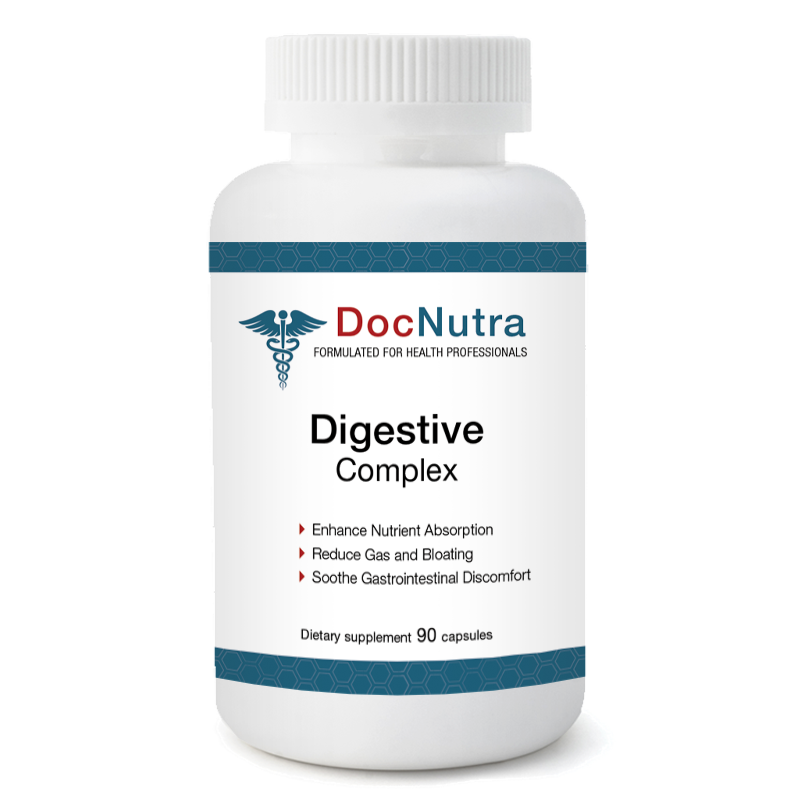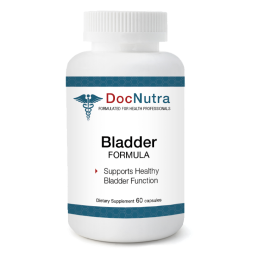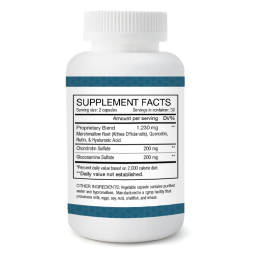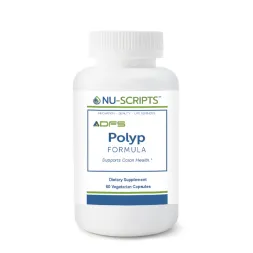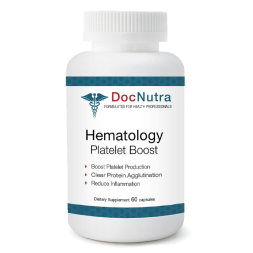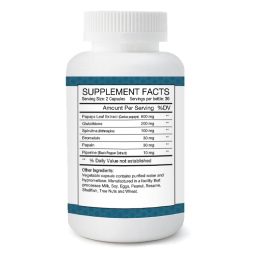Digestive Complex
Digestive enzymes help break down macronutrients into smaller molecules that can be absorbed through the intestinal lining. By enhancing nutrient breakdown, enzyme supplements help ensure the body absorbs the full nutritional value of the foods consumed, supporting energy, immune function, a..
- $39.95
- Quantity Tier Pricing
- 2 or more $29.95
- 12 or more $24.95
The Health Benefits and Function of Digest Complex
Improved Nutrient Absorption
Digestive enzymes help break down macronutrients into smaller molecules that can be absorbed through the intestinal lining. For example:
- Proteases break down proteins into amino acids
- Lipases break down fats into fatty acids and glycerol
- Amylases break down carbohydrates into simple sugars
By enhancing nutrient breakdown, enzyme supplements help ensure the body absorbs the full nutritional value of the foods consumed, supporting energy, immune function, and cellular repair.
2. Relief from Digestive Discomfort
Adults often experience symptoms such as gas, bloating, indigestion, or a feeling of fullness after meals. These symptoms can result from insufficient enzyme activity. Supplementing with digestive enzymes may help:
- Alleviate bloating and gas
- Reduce feelings of heaviness or indigestion
- Improve bowel regularity
Enzymes such as lactase (for digesting lactose), alpha-galactosidase (for beans and legumes), and cellulase (for plant fibers) can target specific food intolerances and sensitivities.
3. Support for Aging Digestive Systems
As we age, our bodies naturally produce fewer digestive enzymes, especially pancreatic enzymes. This can contribute to a gradual decline in digestive efficiency. Supplemental enzymes can help older adults:
- Improve digestion without over-reliance on antacids
- Reduce nutrient deficiencies associated with aging
- Enhance quality of life by easing mealtime discomfort
4. Management of Food Intolerances
For individuals with mild food intolerances—not to be confused with allergies—digestive enzymes can be a practical tool. Examples include:
- Lactase for lactose intolerance
- Gluten-digesting enzymes (e.g., DPP-IV) for those sensitive to gluten (though not a substitute for a gluten-free diet in celiac disease)
- Fructan-digesting enzymes for individuals sensitive to high-FODMAP foods
These enzymes may reduce symptoms such as cramping, diarrhea, or bloating after consuming trigger foods.
5. Pancreatic Insufficiency and GI Conditions
Certain medical conditions can impair enzyme production or release, including:
- Chronic pancreatitis
- Cystic fibrosis
- Celiac disease
- Crohn’s disease
In these cases, enzyme supplementation is often medically necessary to restore proper digestion and prevent malnutrition.
6. Enhanced Gut Health and Microbiome Balance
Proper digestion reduces the amount of undigested food reaching the colon, which can otherwise ferment and feed harmful bacteria. By improving digestion:
- Digestive enzymes help maintain a healthy gut microbiome
- They reduce inflammation and irritation in the digestive tract
- They lower the risk of small intestinal bacterial overgrowth (SIBO) and dysbiosis
Digestive enzymes are essential biological catalysts that break down food into smaller molecules the body can absorb and utilize. Each enzyme targets specific components of food - proteins, fats, carbohydrates, or fibers - enhancing nutrient absorption, supporting digestive comfort, and improving overall gastrointestinal function. Below is a comprehensive overview of the functions and health benefits of 17 important enzymes.
1. Protease
Function: Breaks down proteins into peptides and amino acids.
Health Benefits: Enhances protein digestion, reduces bloating and gas from undigested protein, supports muscle repair, and may reduce inflammation in the gut.
2. Amylase
Function: Breaks down starches (complex carbohydrates) into simple sugars.
>Health Benefits: Improves carbohydrate digestion, reduces bloating after starch-heavy meals, and supports balanced blood sugar levels.
3. Lipase
Function: Breaks down fats into fatty acids and glycerol.
Health Benefits: Supports fat digestion and absorption, prevents greasy stools, and enhances absorption of fat-soluble vitamins (A, D, E, K).
4. Cellulase
Function: Breaks down cellulose, a plant fiber that the human body cannot digest on its own.
Health Benefits: Reduces bloating and gas from fibrous vegetables, and supports gut microbiome by allowing better access to prebiotic fibers.
5. Lactase
Function: Breaks down lactose (milk sugar) into glucose and galactose.
Health Benefits: Prevents gas, bloating, and diarrhea in individuals with lactose intolerance.
6. Bromelain
Function: A protease from pineapple that breaks down protein.
Health Benefits: Supports protein digestion, reduces inflammation, and may aid in soft tissue healing.
Health Benefits of Digestive Herbal Blend
Maintaining optimal digestive health is essential for nutrient absorption, detoxification, and overall well-being. Herbal botanicals such as Anise, Carqueja, Peppermint Leaf, and Boldo have long been used in traditional and clinical herbal medicine for their supportive effects on the gastrointestinal (GI) system, particularly in relieving discomfort, improving liver and bile function, and promoting smooth digestion.
1. Anise (Pimpinella anisum)
Function:
Anise is a carminative herb — meaning it helps relieve gas, bloating, and indigestion. Its aromatic essential oils, particularly anethole, possess mild antispasmodic and anti-inflammatory properties that calm the digestive tract.
Key Digestive Benefits:
Reduces bloating and intestinal gas by relaxing smooth muscles of the GI tract.
Improves digestion by stimulating gastric enzyme secretion.
Eases cramping and discomfort associated with irritable bowel or sluggish digestion.
Supports gut microbiome balance due to its gentle antimicrobial effects.
Clinical Insight:
Anise tea or extract is often recommended for post-meal digestive support and to relieve functional dyspepsia (slow digestion).
2. Carqueja (Baccharis trimera)
Function:
Carqueja is a traditional South American herb used to support liver and digestive health, particularly in managing sluggish bile flow or toxin buildup. It contains flavonoids and saponins that stimulate bile production and protect hepatocytes (liver cells).
Key Digestive Benefits:
Stimulates bile secretion, improving fat digestion and nutrient absorption.
Supports liver detoxification, aiding in the removal of metabolic waste.
Reduces digestive inflammation, easing gastritis and reflux symptoms.
Helps regulate blood sugar and metabolism, indirectly benefiting digestive efficiency.
Clinical Insight:
Carqueja is commonly used as a digestive tonic and hepatoprotective agent, making it valuable in individuals with fatty liver, biliary insufficiency, or poor fat digestion.
3. Peppermint Leaf (Mentha piperita)
Function:
Peppermint leaf is one of the most researched herbs for digestive comfort. Its primary active compound, menthol, provides a cooling, antispasmodic effect on the smooth muscles of the gastrointestinal tract.
Key Digestive Benefits:
Relieves bloating, cramps, and gas by relaxing the intestinal wall.
Improves bile flow, promoting better fat digestion.
Reduces symptoms of irritable bowel syndrome (IBS), such as pain and urgency.
Supports healthy gut motility without causing irritation.
Clinical Insight:
Enteric-coated peppermint oil capsules are frequently used in gastroenterology to reduce IBS symptoms and improve functional dyspepsia, making it one of the most effective natural digestive relaxants.
4. Boldo (Peumus boldus)
Function:
Boldo is a South American herb known for its cholagogue (bile-stimulating) and hepatoprotective properties. It supports both liver detoxification and digestive efficiency, particularly in individuals with slow digestion, gallbladder dysfunction, or constipation related to poor bile flow.
Key Digestive Benefits:
Stimulates bile production and flow, improving the digestion of fats.
Supports liver detoxification pathways, aiding in toxin removal.
Reduces intestinal discomfort and bloating due to sluggish digestion.
Exerts antimicrobial and antifungal activity, helping balance gut flora.
Clinical Insight:
Boldo tea or extract is often recommended for post-meal heaviness, liver support, and biliary insufficiency, especially when paired with other digestive herbs like Carqueja or Peppermint.
* Please be aware that packaging displayed on our website may vary from your order based on factors such as availability and supplier changes, or to improve the readability of product details.
* These statements have not been evaluated by the Food and Drug Administration. This product is not intended to diagnose, treat, cure, or prevent any disease.
Related Products
Tags: enzymes , digestive enzymes , digestive , digest assist , digestive complex ,

